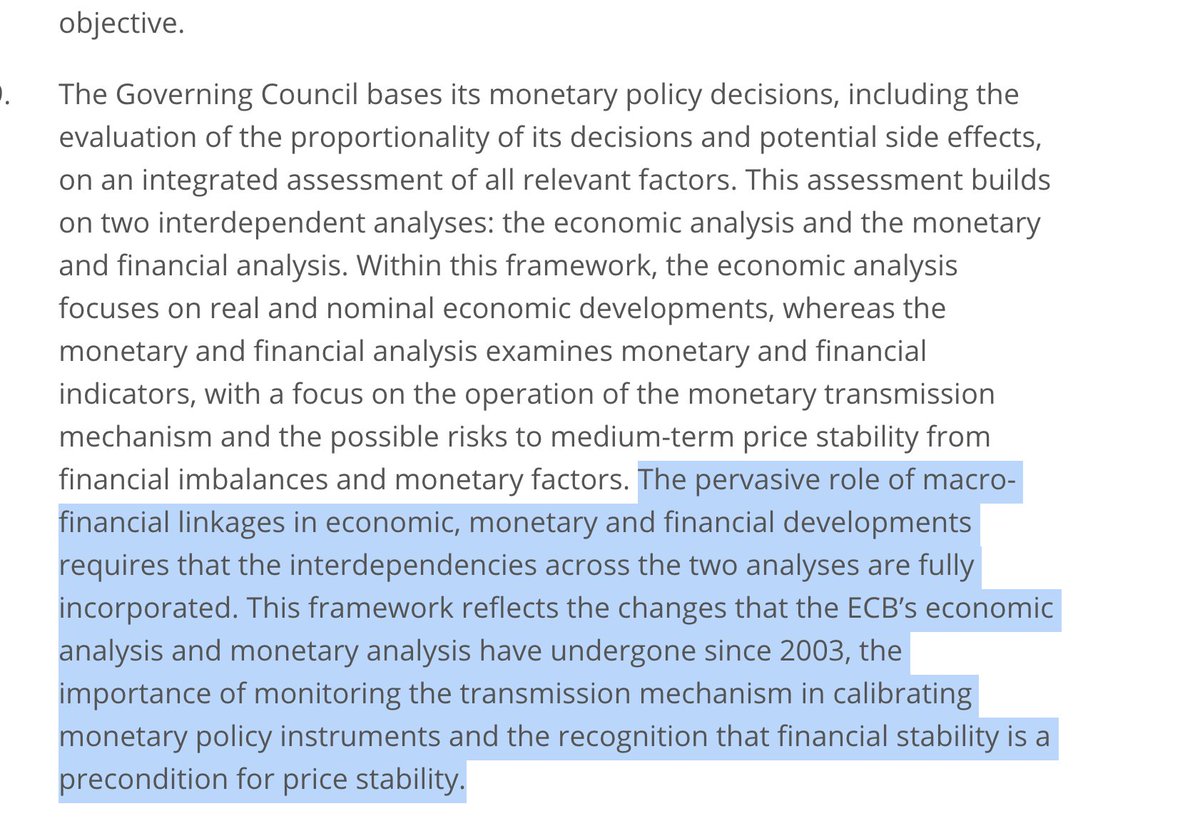
so @ecb new climate strategy is out, and it's letting down those of us who expected an ambitious approach.
in my view, far less ambitious than Bank of England's.
in my view, far less ambitious than Bank of England's.

1. ECB chose a 'risk framework' that emphasises risks that climate crisis poses to private finance, not the ways in which dirty lending accelerates climate crisis
ECB wastes chance to support Commission in its double materiality efforts.
private finance will be happy
ECB wastes chance to support Commission in its double materiality efforts.
private finance will be happy
2. ECB conceives transition risks - those risks to private finance from policies to address climate crisis - as entirely fiscal policy related (carbon prices)
but what about transition risks stemming from ECB decisions to decarbonise collateral & corporate bond purchases?
but what about transition risks stemming from ECB decisions to decarbonise collateral & corporate bond purchases?

3. Despite calls from @Europarl_EN for @ecb to develop dirty taxonomy because Commission has dropped it under pressure from vested political interests
ECB interested in defining green instruments, but not dirty ones.
subsidise green now, penalise dirty later/never
ECB interested in defining green instruments, but not dirty ones.
subsidise green now, penalise dirty later/never

the language on market neutrality is a walk back on the clear rejection of the principle we've heard from Lagarde and Schnable over the past year, a concession to Bundesbank my guess. 

4. The big hitters we expected: ECB plans to decarbonise collateral framework and corporate bond purchases will disappoint @Greenpeace
https://twitter.com/GreenpeaceEU/status/1369953502810750976?s=20
4.1 Collateral: private ratings still in mix, though ECB adjusts its own internal credit ratings to reflect climate risks (as opposed to climate footprint of assets)
'if warranted' leaves room for doing little on collateral, which matters more than corporate bond purchases
'if warranted' leaves room for doing little on collateral, which matters more than corporate bond purchases

Decarbonisation of collateral framework entirely through a risks framework.
here we see how central bank politics and private finance preferences align:
risks framework essentially justifies ECB doing less to accelerate decarbonisation of private finance
here we see how central bank politics and private finance preferences align:
risks framework essentially justifies ECB doing less to accelerate decarbonisation of private finance

risk framework, we know from debates on Sustainable Finance taxonomy, is what private finance pushed for
https://twitter.com/DanielaGabor/status/1249986841358499841?s=20
the most encouraging is the Corporate Bond purchase program, but remember, this is a crisis intervention, whereas collateral framework is an all weather, and therefore stronger decarbonisation instrument 

yes @adam_tooze raises key question: should we applaud converting of notoriously conservative institution or should we pressure it given urgency of climate crisis?
for a second, I let myself believe that ECB would be able to do what Commission failed
for a second, I let myself believe that ECB would be able to do what Commission failed
https://twitter.com/adam_tooze/status/1413101264326598662?s=20
let's compare it Bank of England, who shares the 'orderly transition' take but with a better framework
first, never have quotation marks done a more important signalling job
first, never have quotation marks done a more important signalling job

second, not 'climate risks to portfolios' but climate footprint of corporate bonds @bankofengland has purchased
this is how you identify dirty lending via capital markets
(tricky in practice how one combines backward&forward looking indicators)
this is how you identify dirty lending via capital markets
(tricky in practice how one combines backward&forward looking indicators)

third, the Principles for decarbonising: first carrots for companies to transition to low carbon and then sticks.
one can debate the net zero framing, the credibility of transition plans, and the sequencing, but it's a clear commitment and framework to punish dirty lenders
one can debate the net zero framing, the credibility of transition plans, and the sequencing, but it's a clear commitment and framework to punish dirty lenders

magic word central bank geeks will say a lot over next few years is 'tilting' - the combination of green and dirty assets BoE/ECB choose in its portfolios, either unconvetional or via collateral channel.
Bank of England already has a plan for tilting
bankofengland.co.uk/-/media/boe/fi…
Bank of England already has a plan for tilting
bankofengland.co.uk/-/media/boe/fi…

well @Lagarde is selling the ECB turn to climate better than the documents do: 'it's not just words, but a pretty strong step'
it's definitely a step.
it's definitely a step.
@Lagarde maybe someone should ask 'what in an ideal world would this Strategic Review have included, but you couldnt because you know, ze Germans'
hmm @Lagarde in 5 years time, decarbonisation:
1. Disclosure to be eligible on collateral & corporate bond (very unambitious)
2. 'proper allocation of resources per Treaty - risks better taken into account via tilting and haircuts
single materiality is now name of the game
1. Disclosure to be eligible on collateral & corporate bond (very unambitious)
2. 'proper allocation of resources per Treaty - risks better taken into account via tilting and haircuts
single materiality is now name of the game
• • •
Missing some Tweet in this thread? You can try to
force a refresh









